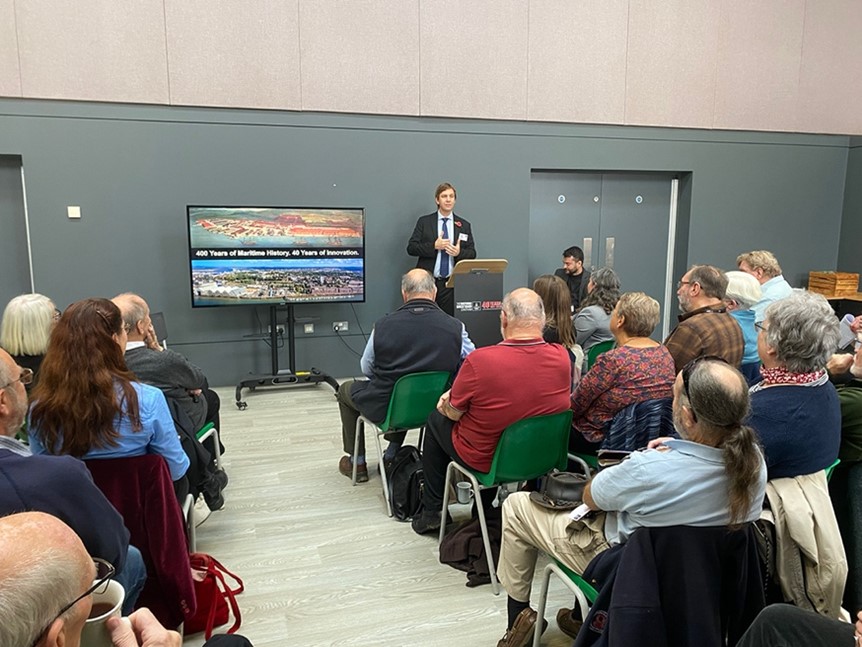Shipbuilding in Kent Conference Report
Posted: Friday 13th December 2024

The Maritime Kent Special Interest Group (MKSIG) held its first conference, Shipbuilding in Kent, at Chatham Historic Dockyard on 7–8 November 2024.
The conference was run in partnership with Kent Archaeological Society and the Chatham Historic Dockyard Trust as part of the programme to mark the 40th anniversary of the closure of the dockyard.
The aim was to provide an introduction to a variety of subjects relating to shipbuilding in the county, as a taster for more focused conferences, study days and workshops in the future. It was also a chance to gauge the level of interest in Kent’s maritime heritage and to get the thoughts of both delegates and speakers on the purpose and future of the MKSIG.
Among the 40 or so people who attended each day were those involved in archaeology, restoration, boatbuilding, historical research, volunteering, local museums, engagement projects, curation, research, and family history. The conference proved to be a rare opportunity for a group with such varied professional and personal maritime interests to come together and share their knowledge and experience.
The Trust's CEO, Richard Morsley, introduced the conference with an address covering the 400-year history of Chatham Dockyard, including its transformation into an important heritage site and its plans for continued heritage and historical work in the future. (Image: Richard Morsley, CEO of Chatham Historic Dockyard Trust, gives the keynote speech [photo: Vanessa Sanderson])
Day One comprised three themed sessions. The first was on Restoration and Replica, with talks on the discovery, conservation, and replica building of the Dover Bronze Age Boat and the restoration of a Whitstable oyster yawl using traditional materials and techniques. The second session was on Ship Archaeology with talks on the Sandwich Bay wooden wrecks (and the research into the 10 unidentified wooden vessels found so far) and the late-Saxon period Graveney Boat discovered near Faversham. The final session on Day One looked at Shipbuilders and Social History, revealing some fascinating stories about the people whose livelihoods depended on Kent's shipbuilding industries. The talks were on the shipbuilders of Deptford Dockyard between 1690–1815, Chatham’s small boat and craft collection and the Austin Family of ship and barge builders based at Aylesford and Chatham.
Day Two comprised a further three themed sessions. The first was Shipbuilding during Wartime and featured talks on shipbuilding at Richborough Port during the First World War and the impact on Faversham shipbuilders James Pollock, Sons and Co. of the Second World War. The second session was on Resources and Research with talks on the research for a new book on the Tilt Boats & Hatch Boats of Gravesend & the London River, 1555–1865 and the Kent-related material held at the National Maritime Museum in Greenwich in particular ship plans and images from the late 1600s to the 1970s. The final session on Day Two focussed on Shipbuilding at Chatham, with talks on HMS Achilles, the first true iron-hulled battleship to be built in a royal dockyard, the Chatham-built HMS Unicorn, a 46-gun frigate launched in 1824 and now berthed in Dundee and the rediscovery and excavation of the wreck of the London, a warship built at Chatham between 1654 and 1656, off Southend.
During the conference delegates also had the opportunity to explore the dockyard including guided tours of the archive and reading room, the conservation lab, and of HMS Ocelot as well as a chance to hear from a diver who served onboard HMS Cavalier. It was also great to see the level of interaction and conversation between sessions and over lunch, with many people commenting that they had made very useful contacts.
The conference drew to a close with an opportunity for speakers and delegates to put forward comments and ideas to the steering group about the direction of the MKSIG and future events.
Comments received from delegates ….
Brilliant! It should be an annual thing.
Excellent venue and selection of talks. Enjoyed meeting new people.
Good mix of people from different backgrounds and disciplines.
Really enjoyed the venue, great to have talks and then an opportunity to see some of the dockyard during lunch. Even better - the opportunity for a tour on both days.
Most enjoyable! Definitely worth doing again. Keeps everyone informed of current projects and developments.
Twenty minutes was the perfect length for talks for me as a non-specialist. I enjoyed the opportunity to talk to the speakers during the breaks. I can now go on and research some of these areas I’m now interested in.
A really friendly and enjoyable two days.
A real privilege to be involved.
Loved the social history content: real families and photos/prints/ paintings/descriptions of seaside towns. Brought it to life.
About the Maritime Kent Special Interest Group
Stuart Bligh, Martin Crowther, Catherine Holt, Keiron Hoyle, Emma Ovenden and Vanessa Sanderson
Webpages - https://www.kentarchaeology.org.uk/groups/maritime-kent-research-group
Facebook - https://www.facebook.com/people/Maritime-Kent-Special-Interest-Group/61566956323289/
